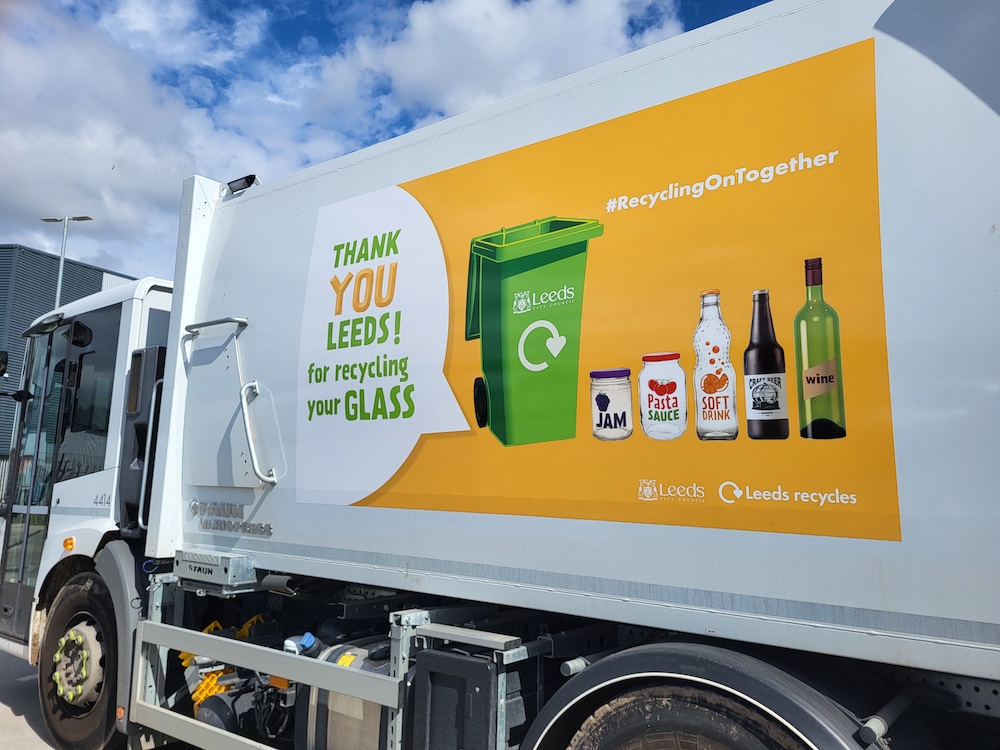
Yorkshire Day (1 August) this year is a double cause for celebration in Leeds due to the successful impact of the first year of household glass collections in the city.
The new service delivered by Leeds City Council, which began a year ago today, has seen nearly 12,000 tonnes of glass recycled by residents across the city through their green bins. That equates to over two million wine bottles per month and has helped save 464 tonnes of carbon dioxide (CO2), the equivalent of taking more than 170 cars off the road. It has also helped increase glass recycling levels in Leeds from 48% to 75% in the first 12 months.
Empty glass bottles and jars are 100% recyclable, with the process able to be repeated endlessly with no loss in quality, delivering significant benefits to the environment.
The council works with Beeston-based contractor HW Martin to sort the glass at its Leeds plant, with over 85% of it being remelted at facilities in Yorkshire to produce new bottles and jars ready for reuse within a month.
The collection service is for any colour of glass bottle or jars, including those for wine, spirits, beer, pop, jam, sauces, coffee jars and spreads. Caps, lids and labels can be left on ready for collection. As part of the Leeds approach to make recycling as simple and easy as possible from home, all glass bottle and jars can go in the green bin; along with paper, cardboard, plastic bottles, pots, tubs and trays, foil and metal cans.
The council is keen to build on the success of the first 12 months by encouraging even more glass to be recycled in green bins. Currently 25% of glass bottles and jars are still needlessly being put in black bins and the council is asking residents to encourage everyone to use their green bins to recycle more.
Another option aside from the green bin is to make use of the extensive network of more than 700 glass recycling banks around the city. Each of these banks is able to hold up to 3,000 bottles and jars. This option is particularly helpful after a party or large gathering to dispose of empty glass, or for those who still prefer to make regular trips to their nearest bottle bank.
While glass bottles and jars can be easily remelted and recycled, a few specialised types -such as oven-proof or Pyrex dishes, lightbulbs, and drinking glasses – require different handling due to their unique melting points. These items can still be given a second life by donating them to a local charity shop or responsibly disposing of them at a household waste recycling centre in Leeds.
Leeds City Council’s executive member for climate, energy, environment and green space, Councillor Mohammed Rafique said:
“The first year of household glass collections has been a big success so we’d like to say a big thank you to everyone in Leeds for their efforts, and on Yorkshire Day we would call on people to continue to be glass acts and recycle even more if they can, as it does make a big and real difference.
“Let’s all work together to make the second year of glass collections even more successful than the first, to help the environment and the Yorkshire economy so that everyone wins.”
Victoria Adams, Marketing and Communications manager, British Glass, said:
“British Glass are pleased to see the success of the approach by Leeds and, importantly, how much glass is now being sorted and then remelted into new bottles and jars within the local area.
“We supported Leeds with the launch a year ago on Yorkshire Day and join with the council in thanking residents for their efforts in this first year and we look forward to even more glass being recycled in the year ahead.”
Declan Nortcliffe, Operations Director, HW Martin Waste said:
“It’s fantastic that Leeds is extracting over 75% of the city’s glass, within a year of taking jars and bottles in the green bin. We prioritise sending this material to local outlets across Yorkshire for remelting, keeping our carbon footprint low and ensuring new products are back on shelves quickly.”
Leeds waste collections services currently empty on average 88,000 bins per day – over half a million a week. Annually, this adds up to almost 33,500 tonnes collected from green bins and over 172,000 tonnes from black bins. Thanks to increases in green bin collections to 10,000 homes in 2024 and a further 40,000 in 2025, all households in Leeds now receive a green bin recycling collection at least fortnightly, with 20,000 households in the most densely housed areas now getting a weekly recycling collection. Less than 0.2% of Leeds kerbside collection waste goes to landfill.
This post is based on a press release from Leeds City Council
While you’re here, can we ask a favour?
South Leeds Life is published by a not-for-profit social enterprise. We keep our costs as low as possible but we’ve been hit by increases in the print costs for our monthly newspaper which have doubled in the last two years.
Could you help support local community news by making a one off donation, or even better taking out a supporters subscription?
Donate here, or sign up for a subscription at bit.ly/SLLsubscribe


